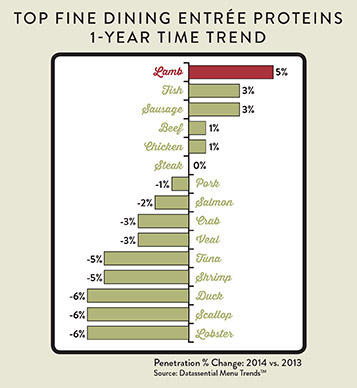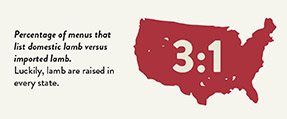
Lamb on the Menu – Fine Dining and Beyond
29 February 2016While rack of lamb remains a staple at white tablecloth restaurants, lamb is appearing more and more beyond fine dining. There’s more to teaching lamb than just chops.
By the American Lamb Board
When chef educators consider how to teach certain proteins, many believe that lamb is only found on fine dining menus. However, research shows that lamb is being served throughout the meal and from venues like fine dining establishments to food trucks.
Fine Dining
A quantitative research study by Datassential MenuTrends™ reveals that lamb’s penetration on fine dining menus is on the rise. The study, which gathered and reported data from more than 1,000 fine dining menus collected in 2014, notes that lamb menu entrée penetration has shown growth. This is in contrast to many of the top menued proteins which have shown declines in recent years. In fact, lamb displayed the strongest menu growth in 2014 versus 2013 when compared to other top entrée proteins.
Lamb remains a fine dining staple with 65 percent menu penetration overall and 62 percent penetration as an entrée protein. While lamb is typically menued as an entrée, lamb is experiencing growth in the appetizer category too. The popularity of small plates and shareables has contributed to the protein’s growth on the appetizer menu. Lamb tartare, meatballs and lollipop chops are popular offerings.
Lamb is heavily favored as a center of plate entrée item but is also growing elsewhere on the entrée menu, with expanding menuing of lamb in burgers, sandwiches, pizzas and pastas. Merguez (a lamb sausage with North African spices) is one of the fastest growing entrée proteins mentioned.

Local Sourcing Lamb
Specifying the origin of lamb continues to grow in popularity on fine dining menus. Fine Dining menus call out domestic lamb 3:1 over imported lamb. Calling out a specific local ranch or farm for lamb has increased by 39 percent over the past year.
“Interest in local food remains strong,” said Megan Wortman, executive director for the American Lamb Board. “Diners want to support their local shepherds.”
Lamb Beyond Fine Dining
Increased consumer acceptance and interest for unique and interesting protein offerings is driving lamb’s growth outside of fine dining as well, according to a Datassential MenuTrends™
2015 US Chain and Independent Menus report. The study, which gathered and reported data from more than 4,800 chain, regional chain and independent restaurants, noted that lamb menuing has increased 10 percent from 2011 to 2015, with 8 percent growth in lamb entrée menu items.
Lamb burgers are being found on more and more menus — up 23 percent in 2015 versus 2014.
“Retail sales of ground lamb have grown 45 percent from 2009 to 2014,” said Wortman. “Ground lamb is growing in popularity on menus as well — from burgers and sliders to meatballs and kaftas.”
Mentions of domestic lamb sources are growing at casual, midscale and QSR as well. From 2005 to 2015, domestic lamb mentions on menus have increased 174 percent. “There are more than 80,000 sheep farmers and ranchers in the United States and sheep are raised in every state,” said Wortman. “For chefs, this means that fresh local lamb is always available.”
About the American Lamb Board
The American Lamb Board is an industry-funded research and promotions commodity board that represents all sectors of the American Lamb industry including producers, feeders, seed stock producers and processors. The Board, appointed by the Secretary of Agriculture, is focused on increasing demand by promoting the freshness, flavor, nutritional benefits, and culinary versatility of American Lamb. The work of the American Lamb Board is overseen by the U.S. Department of Agriculture and the Board's programs are supported and implemented by the staff in Denver, Colorado.
Photos courtesy of the American Lamb Board.
